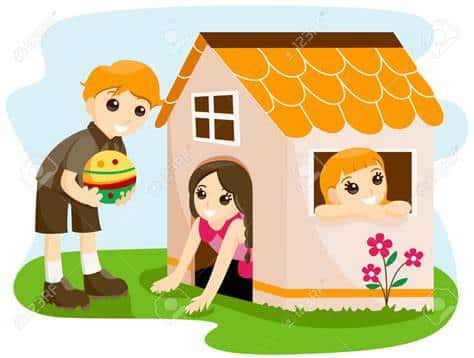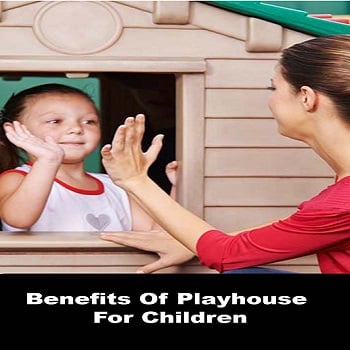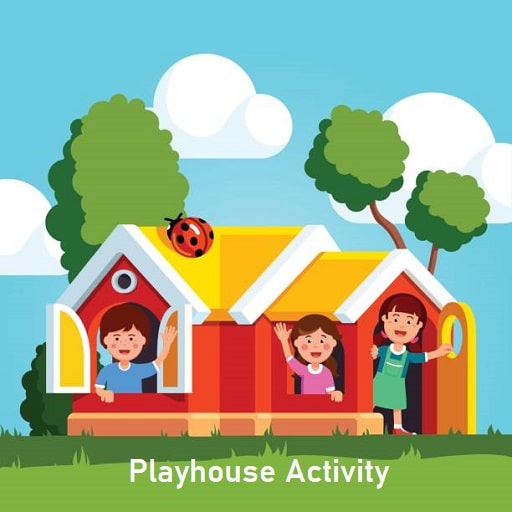When I was twenty-two years old, I wanted two things: 1. To be understood. 2. For people to think I was good at my job....Read more
Yes, playhouses may be remarkable presents for kids for numerous motives: Playhouses sell creativity and creativeness. Playhouse provide an area where youngsters can interact in ingenious play and create their little worlds. Whether they’re pretending to be a chef, a doctor, or an explorer, playhouses permit kids to let their creativity run wild and increase important trouble-solving capabilities through pretend play.
Another gain of playhouses is they inspire social interaction. Kids frequently acquire across the playhouse and play collectively, which allows for enhancing their social abilities, verbal exchange abilities, and teamwork. They can create scenarios and act them out with their pals or siblings, fostering cooperation and friendship. Playhouses also make contributions to bodily interest.

Many playhouses include functions like slides, mountaineering walls, or swings, encouraging kids to be bodily energetic while laughing. Active play is essential for a kid’s improvement and contributes to their general health and properly being.
Playhouses can provide kids with a sense of personal area. Having a playhouse in their personal area gives them an area wherein they could retreat, play independently, and feel ownership over their little area.
So, playhouses are extremely good for children as they provide many advantages, from nurturing their creativity and social abilities to selling physical activity and providing an experience of private space.
Benefits Of Playhouse For Kids

Playhouses can offer numerous blessings for kids in phrases of their physical, emotional, social, and cognitive development. Here are a number of the key advantages of playhouses:
- Imagination and Creativity. Playhouses encourage imaginative play, permitting children to create their eventualities, testimonies, and characters. This type of play fosters creativity and facilitates children to broaden their problem-fixing competencies as they discover special roles and conditions.
- Physical Development. Playhouses frequently contain mountain climbing, crawling, and other physical sports, which improve gross motor capabilities, stability, and coordination. These sports additionally make contributions to higher bodily fitness and usual health.
- Social Skills. When kids play collectively in a playhouse, they learn important social abilities, including cooperation, conversation, sharing, and conflict resolution. Through pretend play, children can act out diverse social conditions, assisting them to apprehend emotions and exercise social interactions.
- Independence and Confidence. Having a space in their playhouse gives children an experience of independence and possession. It turns into an area where they can make choices and discover their hobbies, boosting their self-self-assurance.
- Emotional Expression. Playhouses can be a secure space wherein children can express their feelings and emotions. Through position-gambling and make-accept as true situations, youngsters can act out and procedure one-of-a-kind emotions they’ll encounter daily.
- Language and Communication. Pretend play in playhouses often entails storytelling and conversation with peers. This practice complements language development, vocabulary, and articulation competencies as youngsters engage in conversations and narrate their play.
- Problem-Solving and Decision. Making. Children frequently encounter demanding situations in a playhouse that require hassle-solving and decision-making. As they navigate those situations, they broaden their critical thinking skills and learn to make alternatives independently.
- Stress Relief and Relaxation. Playhouses can serve as relaxing and stress-relieving areas for kids. Engaging in innovative play may be fun for children to unwind and escape from the pressures of daily lifestyles.
- Respect for Boundaries. Playhouses offer a bodily boundary for play, teaching children to recognize personal areas and the bounds of others.
- Parent-Child Bonding. Playhouses may allow dads, moms, or caregivers to play with their kids, fostering sturdy bonds and creating cherished memories. So, playhouses provide many blessings that contribute to an infant’s holistic improvement, making them a treasured addition to any play surroundings.
What age do kids like playhouses
Kids commonly start liking playhouses when they are around 2 to 3 years antique. It’s the ideal time for them to explore their creativity and pretend to play. They’ll enjoy having their little space and pretending to be all styles of characters or gambling residences with their toys. As they age, their interest in playhouses might be preserved until they are around eight to 10.
Some kids might even love gambling in a playhouse beyond that age, so it genuinely depends on the kid and what they experience. So, if you’re thinking about getting a playhouse for an infant, it is a pretty exact guess for kids around the toddler to the early faculty-age range. It’s always incredible to see how children get creative and feature so much fun with playhouses!
Disadvantages of playhouse
Playhouses can provide youngsters numerous blessings, such as opportunities for ingenious play, socialization, and physical interest. So, they come with some negative aspects. Here are some capacity drawbacks of playhouses:
. Safety worries: Playhouses can be capability protection dangers if they are not constructed or maintained nicely. Sharp edges, splinters, unfastened nails, or inadequate structural stability can result in injuries and accidents. . . Limited space: Many playhouses are tremendously small, presenting restrained areas for children to play and pass around easily. This can cause conflicts among kids who need to use the playhouse concurrently.
Exclusionary behavior
Playhouses can often foster exclusionary conduct, wherein certain kids or businesses may also declare possession of the gap, making others’ experiences unwelcome or overlooked.
Maintenance necessities
Playhouses require regular protection to ensure they stay secure and in accurate condition. They may additionally need periodic cleansing, repainting, or repairs, which may be time-ingesting and highly priced for parents or caregivers.
Cost
Playhouses may be pricey, especially if they’re products of amazing materials or include additional capabilities like slides, swings, or add-ons.
Outgrowing the playhouse
Children grow fast, and what can look like an ideal playhouse for a younger child may also become less attractive as they age. The playhouse can be abandoned or underused after a certain age, leading to a waste of sources.
Weather boundaries
Playhouses are normally designed for truthful climate conditions, and they may not be appropriate to be used in the course of extreme heat, cold, rain, or robust winds. This can limit the playtime and utilization of the playhouse at some stage in the yr.
Limited academic cost
While playhouses can foster inventive play, they may offer different instructional fees than other play or learning sports. Playhouses are generally leisure and may not actively sell cognitive or highbrow development. Despite those risks, many mothers, fathers, and educators discover playhouses precious for children’s common improvement and enjoyment.
To mitigate some of these drawbacks, it is critical to pick a properly-constructed and secure playhouse, provide opportunities for various play experiences past the playhouse, and inspire inclusive play among kids.
Do boys play with the playhouse?
Yes, boys can play with playhouses! Play is a crucial part of a toddler’s development, regardless of gender. Playhouses provide a resourceful and innovative area wherein children can interact in pretend play, social interactions, and position-gambling activities. These activities assist children in building essential abilities like conversation, problem-fixing, and empathy.
Traditionally, playhouses could have been advertised to girls with subject matters like dollhouses; however, in the latest years, there was a developing awareness that gender stereotypes should no longer confine toys and play spaces. Many toy manufacturers now offer playhouses with extraordinary issues catering to all children’s pursuits, including boys.
Children should be encouraged to explore their interests and play with toys that spark their imagination, irrespective of gender norms. Playhouses are supposed to be a laugh and academic area for all children, presenting opportunities for growth and development via play.
How big should a kid’s playhouse be
Regarding the scale of a children’s playhouse, there may be a nobody-length-fits-all solution since it relies upon a few elements. The most critical element is considering the age and variety of kids using it.
For younger kids (around 2-five years vintage), a smaller playhouse with dimensions around four toes through four feet (1.2 meters by way of 1.2 meters) has to be sufficient. It’s better to make it manageable for their safety and ease of play. If you’ve got older youngsters (around 6-12 years vintage), consider a barely large playhouse, around 6 ft through 6 feet (1.8 meters by 1.8 meters).
This will give them extra space to transport, play with pals, and use their creativity. Of course, if you have a couple of children or your infant likes to invite pals over for playdates, you may need to go a piece bigger to deal with everybody without difficulty. Another factor to remember is that you are in a hard area. Measure where you plan to put the playhouse and ensure it fits without crowding the environment.
Ultimately, the intention is to create a laugh and safe area for the youngsters to play, so keep their age, a wide variety of customers, and a to-be-had area in thoughts, and you’ll locate the best size for their little journey haven!
Do toddlers like a playhouse?
Yes, Toddlers love playhouses! It’s tremendous to see how much joy and excitement they get from having their little area to play and explore. Playhouses create a world of creativity for them, where they can be grownups, play house, or embark on interesting adventures. The mini doors they can open and close, the windows they can peek through, and the small fixtures they can interact with are all so captivating for them.
Plus, it’s a first-rate way to develop their social and cognitive skills as they interact in fake play with their friends or siblings. Whenever I’ve visible infants around a playhouse, they can spend hours laughing and having a blast! So, if you’re considering getting one for an infant, go for it. They’ll surely adore it!
What does playing house teach children?
Playing house, additionally called pretend play or position-playing, can train youngsters in many treasured abilities and foster essential components in their development. As a teacher, I can spotlight a number of the important thing advantages that youngsters can gain from engaging in this sort of play:
Social and Emotional Development.
Playing residence permits youngsters to discover one-of-a-kind roles and emotions with empathy, cooperation, negotiation, and hassle-solving. These interactions teach them to recognize and manipulate feelings, expand friendships, and beautify their communication talents.
Creativity and Imagination.
Pretend play encourages children to use their creativity to create and explore extraordinary situations and conditions. This helps foster their creativity and hassle-solving capabilities as they develop diverse roles, dialogues, and storylines.
Language Skills. During faux play, children interact verbally with their peers, circle of relatives, individuals, or dolls representing characters in residence. This interplay complements their vocabulary, language improvement, and storytelling capabilities, which are vital for a powerful communique later in existence.
Cognitive Development.
While playing house, youngsters may also stumble upon real-life situations that require them to think critically and make selections. This form of play can stimulate their cognitive improvement, enhancing their memory, reasoning, and decision-making abilities.
Life Skills.
Through faux play, youngsters frequently mimic grownup roles and duties, like caring for a child doll, cooking, or cleaning. This manner introduces them to primary life competencies and allows them to apprehend the importance of responsibility and cooperation in normal obligations.
Role Identification. Playing house can aid kids in the knowledge of one-of-a-kind roles and duties within a family or community. This kind of play fosters an experience of identification and belonging and helps youngsters broaden extra know-how of the sector around them.
Empowerment and Confidence.
As youngsters take on one-of-a-kind roles and solve problems in their creative play, they feel empowered and self-belief. This enhancement in vanity can influence their universal development and mastering reviews—Social Norms and Values.
Pretend play often displays real-lifestyles conditions, and children take in social norms and values through their play experiences. It presents a platform for discussing and information on suitable behaviors, cultural norms, and societal expectancies.
Cooperative Play. Playing house commonly involves a couple of youngsters, encouraging them to engage in cooperative play. This form of interaction facilitates kids to learn how to share, take turns, and collaborate with others, building essential social talents.
So playhouses are an essential and precious factor in an infant’s improvement. As a writer, I encourage and assist such sports as they contribute to the holistic boom of a baby, supporting them in constructing social, emotional, cognitive, and lifestyles talents crucial for their destiny, success and proper-being.


When I was twenty-two years old, I wanted two things: 1. To be understood. 2. For people to think I was good at my job. As a first time founder, I remember feeling under-qualified. I felt like an impostor—and it showed. I struggled to communicate my value in a way that my colleagues and potential investors could understand. I realized I needed to clarify my message and use social media as a tool to help me build my personal brand. This would help me look more credible, I thought. So I got to work. I updated my social media profiles, built a personal website, and began sharing my story online. The more content I shared, the more confident I became. And the more confident I became, the more credible I appeared. Now i am writing blogs for madeforkids.co.uk on different topics on kids.
- Latest Posts by Anna Vatuone
-
What Are The Uses Of A Drone
- -
What Are The Uses Of Playhouse
- -
How To Get A Child To Warm Up To You
- All Posts
